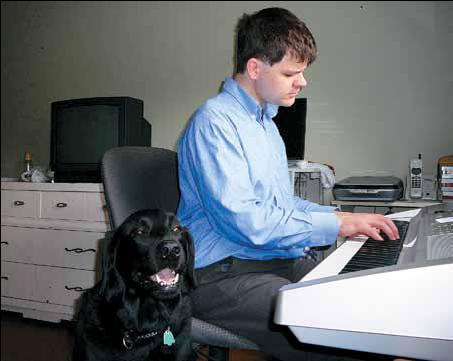Chris Riccomini Shares the Gift of Music
Perhaps you remember your parents dancing to Sinatra’s “Moon River” when you were six years old, or maybe Dylan’s “Lay Lady Lay” was playing when you experienced your first kiss. Like John Cusack’s character in High Fidelity, most of us can probably arrange our favourite albums autobiographically; there are few feelings as satisfying as hearing a great song that perfectly captures an emotion or moment.
But what if you couldn’t remember the song? What if you couldn’t even remember the moment? For many people with Alzheimer’s disease, this is an unfortunate reality.
Enter Chris Riccomini. The 26-year-old music therapist at Sunnyside Home in Kitchener, Ont., has dedicated his life to unlocking elusive memories through music. His tools are a piano, 15 years of classical training, and a compendious knowledge of music from the 1920s to the present. Riccomini always knew he wanted to help people with his ability, and although Wilfred Laurier University’s music therapy program, which he graduated from in 2008, is highly respected, he did occasionally question the practicality of his career path. “Music therapy is still a relatively young field,” he says. “Many music therapists who are just as capable as I am working for years doing contract work before they find something permanent.”
Riccomini’s job search was made more difficult by the fact that he is blind. He admits encountering “resistance” from some prospective employers. He credits Kristen Falkenburger, his supervisor at Sunnyside (he was offered a job after completing a 1,000-hour internship there), as being a like-minded individual who was open to giving both him and music therapy a chance. “Kristen was very supportive,” says Riccomini. “She never doubted my ability to work as an effective music therapist.”
Riccomini runs music-related programs at Sunnyside from 8 a.m. to 5 p.m., five days a week. He plays the piano for groups of people with Alzheimer’s and gives one-on-one sessions in which clients are encouraged to sing, play a variety of percussive instruments, improvise musically and even dance.
Each day at Sunnyside has a theme (such as gardening day or exotic food day), and Riccomini bases some of his therapy on these ideas. While this is certainly enjoyable for the participants, filling a 40-hour work week with music that fits into one of a number of themes means that he is constantly learning new material and planning sessions. However, seeing the positive effect of his music makes it all worthwhile.
As Riccomini plays, a woman in the later stages of dementia sings along and smiles, finding a memory that had been locked away somewhere deep inside her mind. “She lights up. She’s laughing and singing,” Riccomini says. “Music is very good because of it . . . has a strong association to our past.”
Of course, Riccomini knows better than anyone the power that music can have over people. He traces his love of music back to his formative years. One of his first memories of music was from a church service that he and his family attended during Christmastime. “The opening carol was ‘Once in Royal David’s City,’ which began with a boy soprano singing the first verse. Each verse grew steadily louder until they ended with the full choir and organ. I remember listening to how the sound grew and grew, how powerful it sounded, and how it filled me with energy.”
Riccomini now plays the piano at Christmas services in the very same church, inspiring others as he was inspired as a boy. Elizabeth Riccomini, Chris’s sister, is proud of the effect that his playing has on the congregation. “Chris plays at the Christmas Eve service every year,” she explains. “Everyone there looks forward to him playing; it’s their favourite part of the evening. We go to the candlelight service and Chris plays everyone’s favourite carols. It’s always a special time.”
Another important inspiration came in the form of the music Riccomini’s parents enjoyed. “My favourite composer was Mozart. I am not sure why I was drawn to this music. I just had access to my parents’ classical cassettes and I liked how it sounded.”
It was a challenge for his parents to find a piano teacher willing to take on a blind student who couldn’t read sheet music. However, Riccomini entered the W. Ross MacDonald School for the Blind at age 11, and he credits the institution with setting him on his current path. He points to the guidance and patience of Bill Murphy, his first music teacher at the school. “He was a very patient man who persevered to teach me music Braille, even though I was very resistant. He is also the person who made me realize that I had an aptitude for music and that I had enough musical ability to turn it into a career.”
Riccomini received one-on-one music lessons for the 10 years he studied at the school, as well as private lessons in music theory, history, harmony, piano tuning and organ. Indeed, Riccomini points out that if he had been in the public school system, his parents likely wouldn’t have been able to afford such intensive training.
Apart from learning some pretty amazing riffs at W. Ross MacDonald and Laurier, it quickly becomes apparent after watching Riccomini in action that he picked up more than a little patience along the way from Murphy as well. Working with people with Alzheimer’s can sometimes be challenging, but Riccomini’s kind and energetic demeanour make it obvious that he’s exactly where he wants to be.
It’s clear from talking to him that he feels “very grateful” to be working at Sunnyside and helping his clients “achieve social, behavioural and educational goals.” Ironically, after 15 years of running scales, learning theory and wearing out his parents’ Mozart cassettes, it could be argued that it’s Riccomini’s selfless attitude and genuine modesty that have helped his clients more than anything else.
Ryan Leonard White is a freelance writer who lives and works in Ontario.















